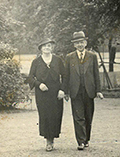Search for Names, Places and Biographies
Already layed Stumbling Stones
Suche

© Privat
Theophile Blanari (née Weile) * 1880
Weidenallee 10 (Eimsbüttel, Eimsbüttel)
HIER WOHNTE
THEOPHILE BLANARI
GEB. WEILE
JG. 1880
DEPORTIERT 1941
MINSK
???
further stumbling stones in Weidenallee 10:
Jacob Blanari
Jacob (Ernst) Blanari, born on 27 Aug. 1880 in Berlin, deported on 8 Nov. 1941 to Minsk
Theophile Blanari, née Weile, born on 19 July 1880 in Prechlau (Przechlewo/Poland), deported on 8 Nov. 1941 to Minsk
Weidenallee 10
Since 1935, Jacob Blanari – who was called Ernst - ran the training workshop for cabinetmakers at Weidenallee 10a, which the German-Israelitic Community had set up in Mar. 1934. The same address also housed a training workshop for metalworkers. In the workshops, Jewish adolescents were prepared for their emigration to Palestine. Since Jacob Blanari was involved in a professional capacity in the hachshara of Jewish youth and their journey to Palestine, it certainly would have made sense for the family to have the Blanari children look for a future outside of Germany. The parents stayed, perhaps not having the courage anymore to attempt a new beginning in a different part of the world.
Jacob/Ernst Blanari came from Berlin. His parents were Hermann Blanari, a master furrier, and Anna, née Näkler (or Hanna, née Mekler, born 1853). He had five other siblings: Frida, Rosa, Fanni, Sarina (nominal name Klara), and David (nominal name Fritz). (For Sarina Wolff, née Blanaré, there is a stumbling stone at Osterstraße 83.) His wife Theophila came from West Prussia. The Schlochau District had become Prussian after the First Partition of Poland in 1772. In 1871, 55 Jews lived in Prechlau, but their number declined afterwards.
The Blanaris had four children: Hermann (born in 1905), Erwin (born in 1906), Cäcilie (born in 1908, died in 1925), and Elfriede (born in 1915, died in 2009). Hermann and Erwin were born in Berlin, Cäcilie in Finsterwalde, and Elfriede in Altona. This means that the family probably moved to Altona and Hamburg, respectively, only after 1908.
In the period before 1933, Jacob Blanari had tried to earn a living by running several businesses and production facilities for household goods. In 1919, he apparently rented business premises at Alter Steinweg 61 III for a cabinetmaker’s workshop as well as a staining and polishing operation. There is indeed an entry in the directory of 1920 and the following years: "Blanari, J., Möbelfabrik (furniture plant), Alter Steinweg 61, Hinterhaus (rear house), Verkaufsräume (salesrooms) Schaarsteinweg 6, Wohnung (residence): Steinweg Passage 1.” In 1920, he registered a business for yard goods located at Hütten 123. According to the restitution file, it seems that he ran a business for toiletries and perfumes in Wandsbek and a furniture store at Chrysanderstraße 3–9 in Bergedorf until 1932. It appears that the family lived in Wandsbek for a time, and Jacob Blanari apparently rented commercial space there for manufacturing household goods, such as washboards, clothespins, etc. However, this data cannot be verified using the directories.
In 1926, Tornquiststraße 23 appears as a residential address in the Hamburg directory and in the early 1930s Alsenstraße 13 and Eppendorfer Weg 73. Before Jacob Blanari assumed his work at the training workshop, the family seems to have led a very precarious life in terms of finances, connected with a steady succession of new attempts at earning a living, and with frequent moving. Presumably, it was impossible to continue the furniture production dating from the early 1920s through the years of inflation and economic crisis.
Until his deportation, Jacob Blanari worked in the training workshop. The couple received the order to report for the second large-scale deportation to Minsk, where all traces of them disappear.
The deportation of the Blanaris also meant the end of the Jewish cabinetmaker’s training workshop on Weidenallee. After that, the actor and cabinetmaker Fritz Benscher relocated with the workshop equipment to the religious building of the Jewish Cemetery in Stellingen-Langenfelde, where he continued to run the workshop, producing coffins required by the Community.
The Blanari-children Hermann, Erwin and Elfriede Blanari survived in emigration. Hermann Blanari emigrated to Palestine and returned to Hamburg in 1953. He was buried in the Jewish Cemetery in Hamburg. Erwin arrived in Colombia in August 1938 with his wife Olga, née Benjamin, and his son Ernst, born in 1935. In 1942, their second son Teodor Benjamin Blanari was born there. Elfriede emigrated to Palestine by way of Yugoslavia in 1934. She received agricultural training on the Jewish Baron Gutmann’s estate near Subotica, which he had put at the disposal of the Hechaluz. After her marriage her name was Elfriede Richheimer (Rich). In the 1950s, she returned to Germany for a brief period, subsequently going to the USA.
Translator: Erwin Fink / Additions Beate Meyer February 2023
Kindly supported by the Hermann Reemtsma Stiftung, Hamburg.
Stand: February 2023
© Susanne Lohmeyer
Quellen: 1; 4; StaH 351-11 AfW, AZ 040515 und AZ 160306 und AZ 270880 und AZ190780; Peter Offenborn: Jüdische Jugend, S. 347, 806, 830, 839; Daniel Hoffmann, Lebensspuren meines Vaters, Göttingen 2007, S. 63; Beate Meyer, Fritz Benscher. Göttingen 2017, S. 50ff.; Israelitisches Familienblatt v. 27.6.1935, S. I/II; StaH 522-1 Jüdische Gemeinden 992e2 Band 2 Deportationsliste; HAB II 1920, 1923, 1926, 1939, 1942; http://mywebtimes.com/archives Zugriff am 5.6.2012; mail von Teodor Benjamin Blanari vom 29.7.2013.
Zur Nummerierung häufig genutzter Quellen siehe Link "Recherche und Quellen".

